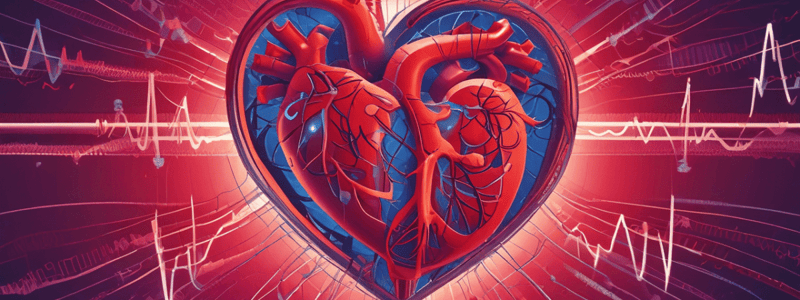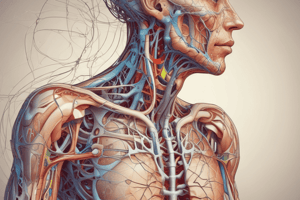Podcast
Questions and Answers
What type of receptors are sensitive to changes in O2, CO2, and lactic acid during exercise?
What type of receptors are sensitive to changes in O2, CO2, and lactic acid during exercise?
Chemoreceptors
How does the cardiac control centre respond to changes in blood pressure and stretch within the blood vessel walls during exercise?
How does the cardiac control centre respond to changes in blood pressure and stretch within the blood vessel walls during exercise?
By stimulating the sinoatrial node via the sympathetic nervous system, which increases heart rate
What happens to heart rate after exercise has stopped, and why?
What happens to heart rate after exercise has stopped, and why?
Heart rate decreases, due to the reduction in thermoreceptors
What type of nervous system is involved in increasing heart rate during exercise?
What type of nervous system is involved in increasing heart rate during exercise?
What type of receptors are sensitive to changes in muscle and blood temperature, and help to regulate heart rate during recovery?
What type of receptors are sensitive to changes in muscle and blood temperature, and help to regulate heart rate during recovery?
What is heart rate regulation, and why is it important to know our resting heart rate (RHR) when exploring this topic?
What is heart rate regulation, and why is it important to know our resting heart rate (RHR) when exploring this topic?
What role do hormonal controls play in heart rate regulation, and how do they affect heart rate during anticipation of physical activity?
What role do hormonal controls play in heart rate regulation, and how do they affect heart rate during anticipation of physical activity?
What is the role of neural control in heart rate regulation during exercise, and how do proprioreceptors contribute to this process?
What is the role of neural control in heart rate regulation during exercise, and how do proprioreceptors contribute to this process?
What is the average resting heart rate for an adult, and how is it typically measured?
What is the average resting heart rate for an adult, and how is it typically measured?
How does a warm-up affect heart rate, and what is the underlying physiological mechanism responsible for this change?
How does a warm-up affect heart rate, and what is the underlying physiological mechanism responsible for this change?
What stimulates the cardiac control centre during exercise, leading to an increase in heart rate?
What stimulates the cardiac control centre during exercise, leading to an increase in heart rate?
How does the parasympathetic nervous system control heart rate during exercise?
How does the parasympathetic nervous system control heart rate during exercise?
What type of receptors detect changes in blood pressure and affect heart rate?
What type of receptors detect changes in blood pressure and affect heart rate?
How does hormonal control alter heart rate during exercise?
How does hormonal control alter heart rate during exercise?
What intrinsic control mechanism helps to decrease heart rate after exercise?
What intrinsic control mechanism helps to decrease heart rate after exercise?




